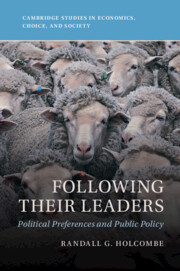

Back in May 2023, co-blogger Kevin Corcoran posted on Randy Holcombe’s discussion of how people form preferences on government policies. Kevin quoted Randy as follows:
The Republican party, at least since Ronald Reagan’s presidency, supported free trade, but after President Trump won on a protectionist platform aimed at China, Mexico, and other countries, most Republicans did not push back and argue that Trump’s protectionist policies were out of step with the party’s values. Rather, they supported Trump’s trade policies.
This quote is from Randall G. Holcombe, Following Their Leaders: Political Preferences and Public Policy, Cambridge University Press, 2023. Kevin wrote:
These are voters whose beliefs about free trade were simply a derivative preference, derived from their anchor preference of identification with the Republican party. When the Republican party advocated free trade, so did they. And when the Republican party turned away from free trade, so did they. In the same way, after Trump’s rise to prominence in the Republican party, support for free trade among Democrats shot up dramatically, to significantly higher levels than Republican support for free trade during the presidency of George W. Bush.
I don’t disagree with this reasoning. I think there’s lot to it. But I do want to point out a counterexample. Back in 2021, Trump revealed to his supporters that he got a booster for the COVID-19 vaccine. A fair number of them booed. So they didn’t adjust their views based on the guy that many of them seemed to love.
Of course you could argue that they can’t adjust their views instantly. It’s quite conceivable that many of them thought that Trump wouldn’t get a booster and thus, in their view, be “on their side.” So they might have booed out of surprise. Still, a fair number of them had to know that he had done Operation Warp Speed to get the original vaccine produced quickly. If they had adjusted their views of the vaccine to what they must have thought his view was, they would have been in favor. But a fair number of members of the audience, going by the volume, saw him as being wrong on this.

READER COMMENTS
Thomas L Hutcheson
Jan 27 2024 at 3:06pm
Warp Speed occurred during the Trump Presidency. So did an amazing number of sub-optimal choices by federal public health officials. I ascribe near zero credit and blame to Trump for these things.
David Henderson
Jan 27 2024 at 3:10pm
Your comment is kind of off topic but you do have me curious, so I’ll bite. Why does he deserve zero credit for OWS and zero blame for making Fauci point man?
Thomas L Hutcheson
Jan 27 2024 at 10:17pm
I’ve no insight to the inner workings, but I’d sort of heard that Pence was the actual high level mover on vaccine development. I take it that Fauci was just saying what the consensus PH establishment was thinking. The PH messaging did not suddenly pivot to giving individuals and policy makers the tools with whit THEY could make cost effective decisions about vaccinations and NPI’s when Biden was elected. It was an institutional failure, not SFAIK ,Trump’s fault.
Jon Murphy
Jan 28 2024 at 9:03am
It was an institutional failure, but it was one started by Trump himself and persisted under Biden. OWS (which re-branded into the COVID-19 Task Force under Biden) was an ad hoc advisory committee convened by Trump with the goal of promoting vaccine development through bounties and other incentives.
Jim Glass
Jan 27 2024 at 4:05pm
Voters vote primarily “anti” rather than “for”. That’s why negative advertising damning the other side outweighs positive advertising by so much.
Feminists didn’t support serial horndog adulterer and accused rapist Bill Clinton because of his enlightened attitude towards women, They did it because they were never, ever going to vote for the Republican Party of anti-abortion Christian Coalitionists who wanted to return women to slavery back in the kitchen. Evangelical Christians aren’t voting Republican because of Trump’s professed love of Jesus and his honoring of the 10 Commandments. They’re doing it because they are never, ever going to vote for the Democratic party of godless rich liberal elites who look down on them calling all white people (like them) racists, force trans people into the ads for their (formerly) favorite beer, want grown men exposing themselves to their daughters in the ladies room, etc., etc.
In a two-party system, each party has a lot of “anti” groups herded together. The anti-vaxers are really emotionally anti-vax. So when Trump creates a vax, their anti-vax emotions trump him. But they are never, ever going to vote for the Democratic party of liberal elites who took away their God-given right to breath without wearing a mask, and forced them to get jabbed to keep a job or even just socialize with friends, etc. So their booing Trump was not a Democrat/Republican reaction. (Not long ago the anti-vax movement itself was a solidly rich liberal-elite thing, say “Kennedy”. It’s sudden transplant into the Republican populist base is pretty interesting…)
steve
Jan 27 2024 at 9:25pm
Just as a point of clarification, having followed this pretty closely since Wakefield’s fraudulent paper, the people who were most out in public as anti-vax were leftie celebrities. However, if you looked at actual vaccination rates and who refuses to get vaccinated there has always been a fairly large group on the right, largely rural and often based upon their religion, who have been anti-vax. The actual numbers divided pretty evenly between what you would consider red and blue areas so when you look at actual state policies regarding vaccines they dont really follow a right vs left paradigm.
Steve
Jim Glass
Jan 28 2024 at 12:14am
Steve:
Good information, thanks.
Jim Glass
Jan 28 2024 at 1:30am
Ha. As to people primarily vote “against” rather than “for”…
I went out to a local bistro for dinner tonight. There’s a TV over the bar, of course politics on it, and Biden comes on. A group of middle age adults, not kids, starts going “Ach, Biden, is he awake?”, “Does he know if he’s awake?”, “Doesn’t a country need a leader who’s not senile and can climb stairs?” “And can speak a sentence?”, then finally… “Why would anyone vote for Biden?”
I’ve long since given up political arguing. but I do sometimes like to tease people by putting on a friendly happy smiling face while asking a hostile challenging question – the mismatch can produce interesting responses. So I spoke up with a big smile, “I dunno. Maybe if the other candidate is under four criminal indictments, has been found by a jury to be a sexual molester and slanderer, has had the courts rule he’s run a fraudulent family business, has had several of his closest aides been convicted of felonies, and cheats at golf, some people would vote for Biden instead?” Friendly face. Just asking.
They answered a little flustered with, “Trump’s not convicted of anything … Trump is a man who can stand up and speak for this country … Biden is the walking dead”
Being an empirical sort, I asked: “Trump is 77 and obese, Biden is 81, how many more indictments, convictions, jury verdicts, would it take to equalize out those four years?” Still very friendly.
Their flustered spokesperson finally goes, “Look, Trump can be a jackass, everybody knows that. I’d like somebody better than Trump. But he’s the only Republican who can beat Biden.” I said, “Fine. I agree!”, bought him a drink and we were friendly the rest of the evening.
I rest my case.
You asked: “Is the United States Beyond Hope?” No, though our democracy may be, and I still have enough wine in me to go there, but I won’t.
Kevin Corcoran
Jan 30 2024 at 4:12pm
Good afternoon David!
I didn’t notice this post until now (it’s been a hectic time lately) so I’m a bit late in this follow up, but I don’t think what you’ve identified here necessarily counts as a counterexample to Holcombe’s anchor and derivative preference model. The model itself leaves it open as to what the particular anchor is – different people will anchor on different things, and thus one person’s anchor preference might be another person’s derivative preference. Holcombe writes:
Thus, people who were anchored to the Republican party adopted Trump-like views when he became the effective leader of the Republican party. People who instead anchored on conservative ideology (such as George Will) left the Republican party. For the former person, being a Republican is an anchor preference, whereas for George Will, conservative ideology was the anchor and his past support for the GOP was merely a derivative preference from that anchor.
So the fact that some people in a pro-Trump crowed might boo his comments in favor of Covid vaccinations is not in itself a counterexample to this model – it’s an illustration about how anchor and derivative preferences can differ and come into conflict. Some people in the crowed were anchored to the Republican party. Some were anchored by their loyalty to Trump specifically. But others may have been anchored to a more antiestablishment worldview that, among other things, is more prone to be dismissive of or hostile to vaccines – and to the extent the believed Trump was an exemplar of such a worldview, they supported him. For people with that kind of anchor, booing Trump’s comment supporting Covid vaccination is what we would expect.
Comments are closed.